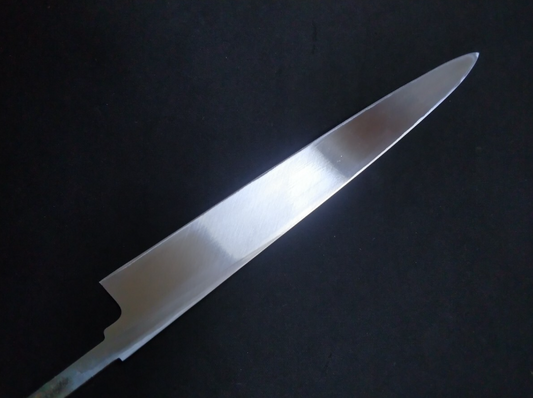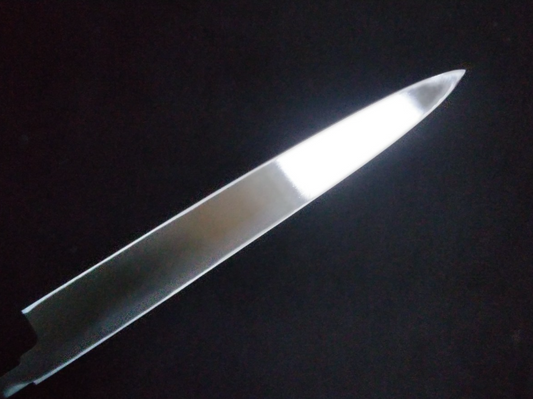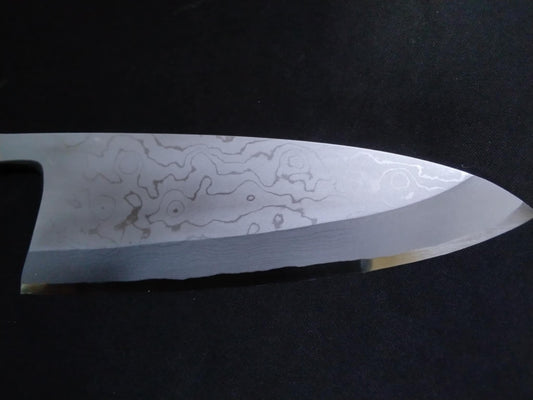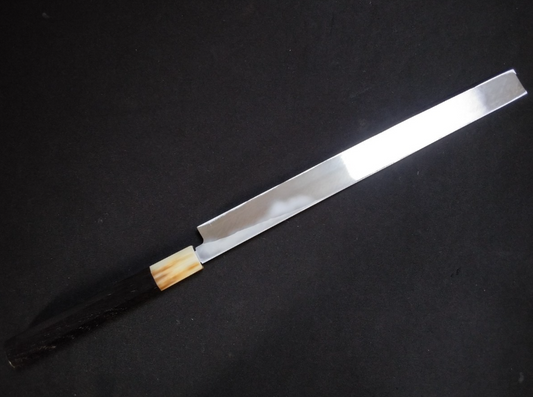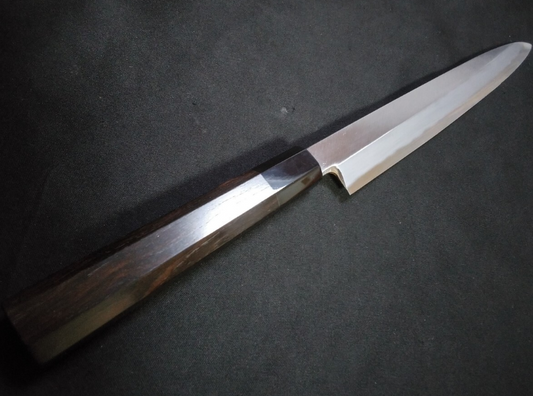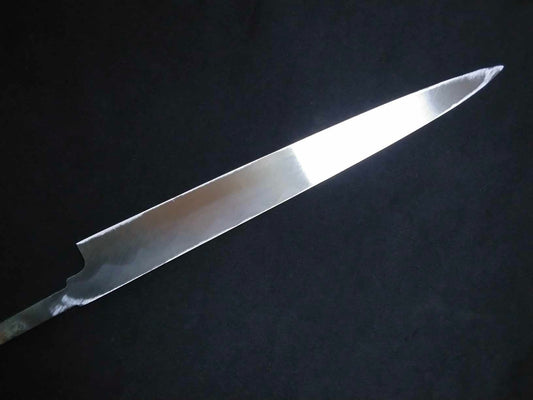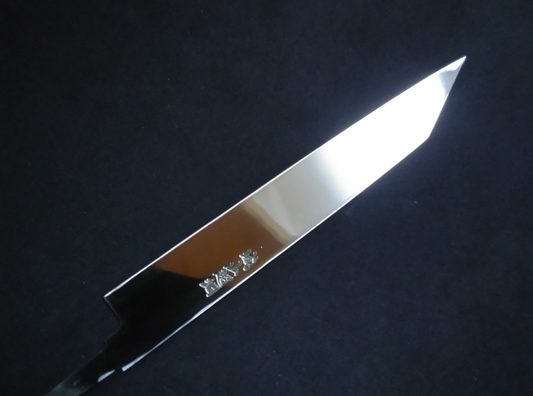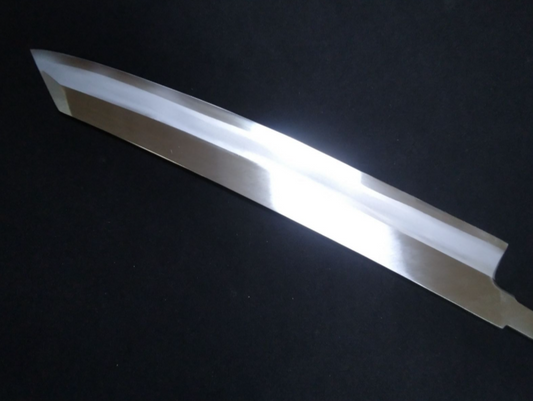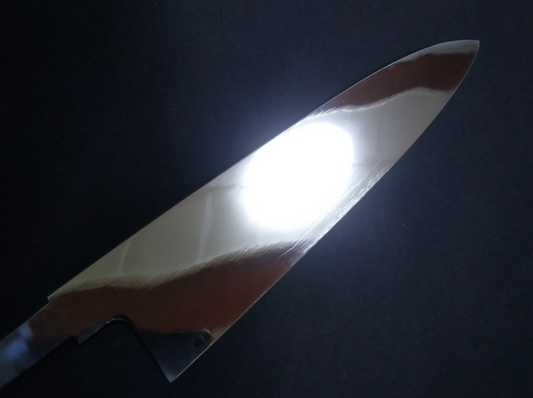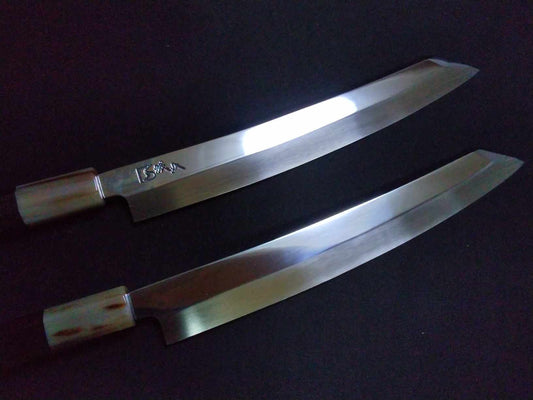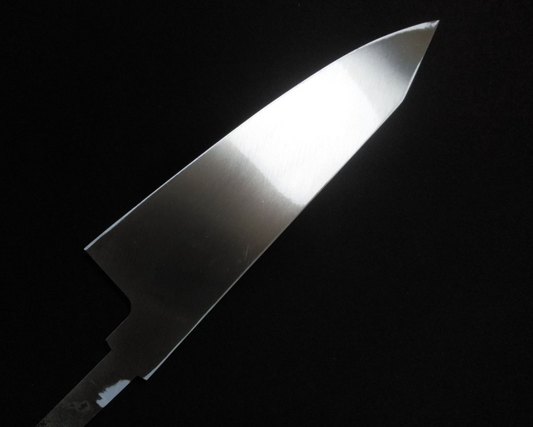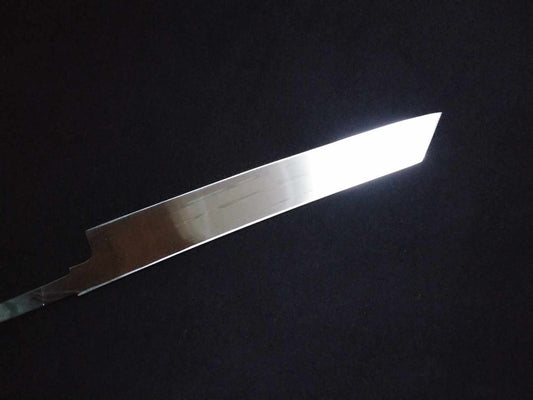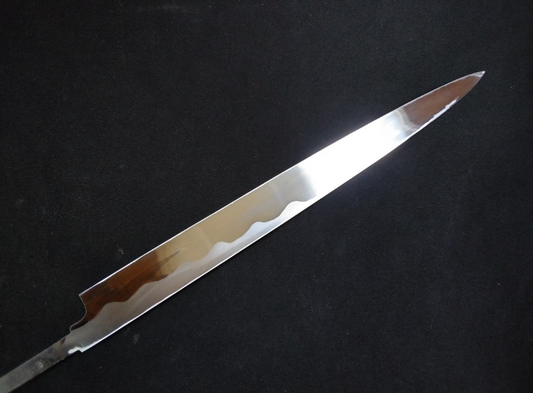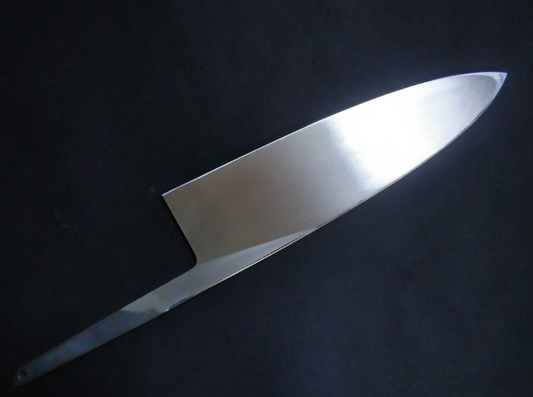
Tadayoshi Yamatsuka
-
The Shining Edge of Tradition
In the heart of Sakai City, where Japanese knife-making traditions have flourished for over 600 years, Tadayoshi Yamatsuka perfects the art of mirror polishing. Recognized as a Traditional Craftsman in 2022, Yamatsuka transforms raw steel into blades of unmatched sharpness and elegance, each reflecting not just light but the dedication and skill of its maker. This is the story of a man committed to preserving the past while shaping the future of Japanese knife craftsmanship.
-
Sakai Traditional Craftsman Collection: Tadayoshi Yamatsuka
-
White Steel #2 Yanagiba 240mm-Kido Finishing
Regular price $270.00 CADRegular priceUnit price / per -
White Steel #2 Yanagiba 270mm-Kido Finishing
Regular price $310.00 CADRegular priceUnit price / per -

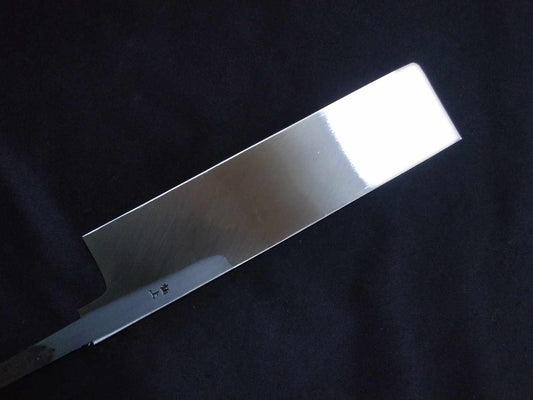 Sold out
Sold outWhite Steel #2 Usuba 210mm
Regular price $346.00 CADRegular priceUnit price / per$334.00 CADSale price $346.00 CADSold out -
White Steel #2 Damascus Deba 150mm-Mirror Polished Blur Finish
Regular price $346.00 CADRegular priceUnit price / per$0.00 CADSale price $346.00 CADSold out -
White Steel #2 Takohiki 270mm-Kido Finishing
Regular price $350.00 CADRegular priceUnit price / per -
White Steel #1 Yanagiba 270mm-Kido Finishing
Regular price $380.00 CADRegular priceUnit price / per -
Blue Steel #2 Yanagiba 270mm- Mirror Polished(one side)
Regular price $385.00 CADRegular priceUnit price / per$0.00 CADSale price $385.00 CADSold out -

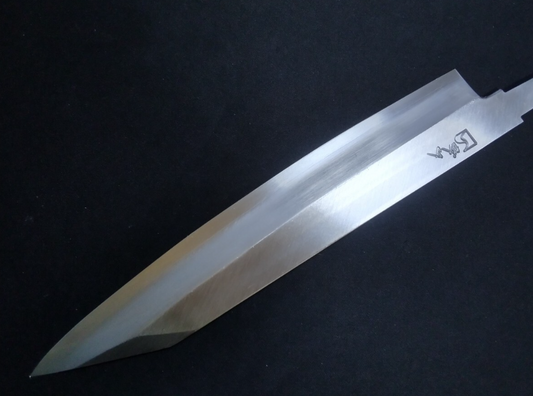 Sold out
Sold outGinsan Gyuto 240mm -Kido Finishing
Regular price $410.00 CADRegular priceUnit price / per$0.00 CADSale price $410.00 CADSold out -
Ginsan Yanagiba(Kiritsuke) 225mm -Mirror Polished(both sides)
Regular price $412.00 CADRegular priceUnit price / per$0.00 CADSale price $412.00 CADSold out -
Blue Steel #2 Gyuto 270mm-Kido Finishing
Regular price $420.00 CADRegular priceUnit price / per$0.00 CADSale price $420.00 CADSold out -
Ginsan Gyuto 210mm -Mirror Polished(both sides)
Regular price $430.00 CADRegular priceUnit price / per$0.00 CADSale price $430.00 CAD -
Super Steel (Honyaki) Yanagiba(Kiritsuke) 210mm-Mirror Polished(one side)
Regular price $433.00 CADRegular priceUnit price / per$0.00 CADSale price $433.00 CAD -
Ginsan Deba 210mm -Mirror Polished(one side)
Regular price $440.00 CADRegular priceUnit price / per$0.00 CADSale price $440.00 CADSold out -
Super Steel (Honyaki) Yanagiba(Kiritsuke) 210mm-Mirror Polished(both sides)
Regular price $443.00 CADRegular priceUnit price / per$0.00 CADSale price $443.00 CAD -
Blue Steel #2 Yanagiba 300mm -Mirror Polished(both sides)
Regular price $460.00 CADRegular priceUnit price / per$460.00 CADSale price $460.00 CADSold out -
White Steel #2 Damascus Deba 210mm-Mirror Polished Blur Finish
Regular price $460.00 CADRegular priceUnit price / per$0.00 CADSale price $460.00 CADSold out
Tadayoshi Yamatsuka – Master of Japanese Knife Mirror Polishing
-

Tadayoshi Yamatsuka, a highly respected traditional craftsman from Sakai City, is renowned for his exceptional mastery in mirror polishing and sharpening Japanese knives. Recognized as a Traditional Craftsman in 2022, he specializes in creating blades of unparalleled sharpness and beauty, elevating them from tools to works of art. His dedication to preserving Sakai’s centuries-old knife-making heritage while passing his skills to the next generation makes him a vital figure in the industry.
-
KIREAJI's Three Promises to You
-

1. Forged in the Legacy of Sakai
From Sakai City—Japan’s renowned birthplace of professional kitchen knives—each blade is crafted by master artisans with over six centuries of tradition. Perfectly balanced, enduringly sharp, and exquisitely finished, every cut carries the soul of true craftsmanship.
-

2. Thoughtful Care for Everyday Use
Every knife includes a hand-fitted magnolia saya for safe storage. Upon request, we offer a complimentary Honbazuke final hand sharpening—giving you a precise, ready-to-use edge from day one.
-

3. A Partnership for a Lifetime
A KIREAJI knife is more than a tool—it is a lifelong companion. With our bespoke paid aftercare services, we preserve its edge and beauty, ensuring it remains as precise and dependable as the day it first met your hand.
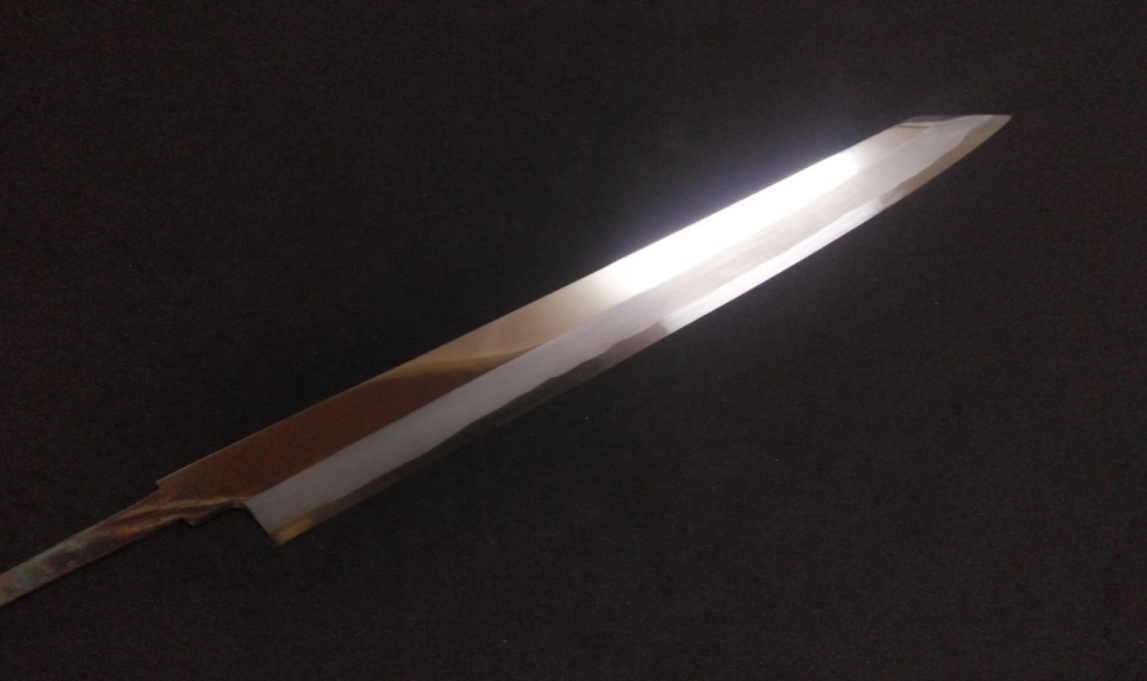
Why Many Product Photos Show Only the Blade
At KIREAJI, every knife is made to order in Sakai, Japan. Photos show the blade before the handle is attached, allowing artisans to perfect the balance and edge for your specific order. Your knife arrives fully finished — tailored just for you.

Global Delivery from Sakai
Across the world, discerning cooks seek authentic Japanese knives from Sakai — Japan’s legendary knife-making city with over 600 years of tradition.
At KIREAJI, we work alongside master artisans in Sakai to fulfill that desire, shipping genuine handcrafted knives directly from the workshop to kitchens worldwide.
Tadayoshi Yamatsuka – Master of Japanese Knife Mirror Polishing
-
A Craftsman of Sakai City
Tadayoshi Yamatsuka stands among Sakai City’s most skilled artisans, recognized in 2022 as a Traditional Craftsman for his extraordinary expertise in Japanese knife polishing. He is an active member of both the Sakai Blade Industry Cooperative Association and the Sakai Traditional Craftsmen Association, contributing greatly to the preservation and promotion of Sakai’s renowned blade-making tradition.
-

Exceptional Skills and Mirror Polishing Mastery
Yamatsuka’s knives are celebrated for their flawless mirror finish, achieved through meticulous hand-polishing techniques that require both precision and patience. His mastery extends to single-bevel, double-bevel, and ultra-thin blade sharpening, producing exceptional sharpness and a finish that reflects light like a polished jewel. These knives are not merely cooking tools—they are the embodiment of beauty, functionality, and the soul of their maker.
-
Commitment to Tradition and Passing on the Craft
Driven by a philosophy of relentless pursuit of sharpness and craftsmanship excellence, Yamatsuka devoted himself to perfecting his techniques in his workshop. Equally committed to mentoring the next generation, he worked to ensure that the traditional methods of Sakai knife polishing would endure for years to come.
-

A Family Legacy in Blade-Making
The Yamatsuka name is deeply rooted in the history of Japanese bladesmithing. Tadayoshi is the son of Yoshikazu Yamatsuka and a brother disciple of Mitsuo Yamatsuka, who trained under Yoshikazu. This lineage has fostered a profound respect for tradition and a determination to advance the craft with each generation.
-
A Legacy Passed On
In recent years, Tadayoshi Yamatsuka has stepped back from active knife-making, entrusting his craft to Kohei Yamatsuka, who now continues the family’s legacy. Under Kohei’s skilled hands, the tradition of mirror polishing lives on—honoring his predecessor’s dedication while bringing fresh energy and innovation to Sakai’s centuries-old blade-making heritage.
-
Knives That Bring Craftsmanship to Your Kitchen
Owning a mirror-finished knife by Tadayoshi—or now by Kohei—Yamatsuka is to experience a tangible connection to Japan’s finest traditions. Every blade is a harmonious blend of razor-sharp performance and elegant artistry, designed to enhance the joy and precision of cooking.
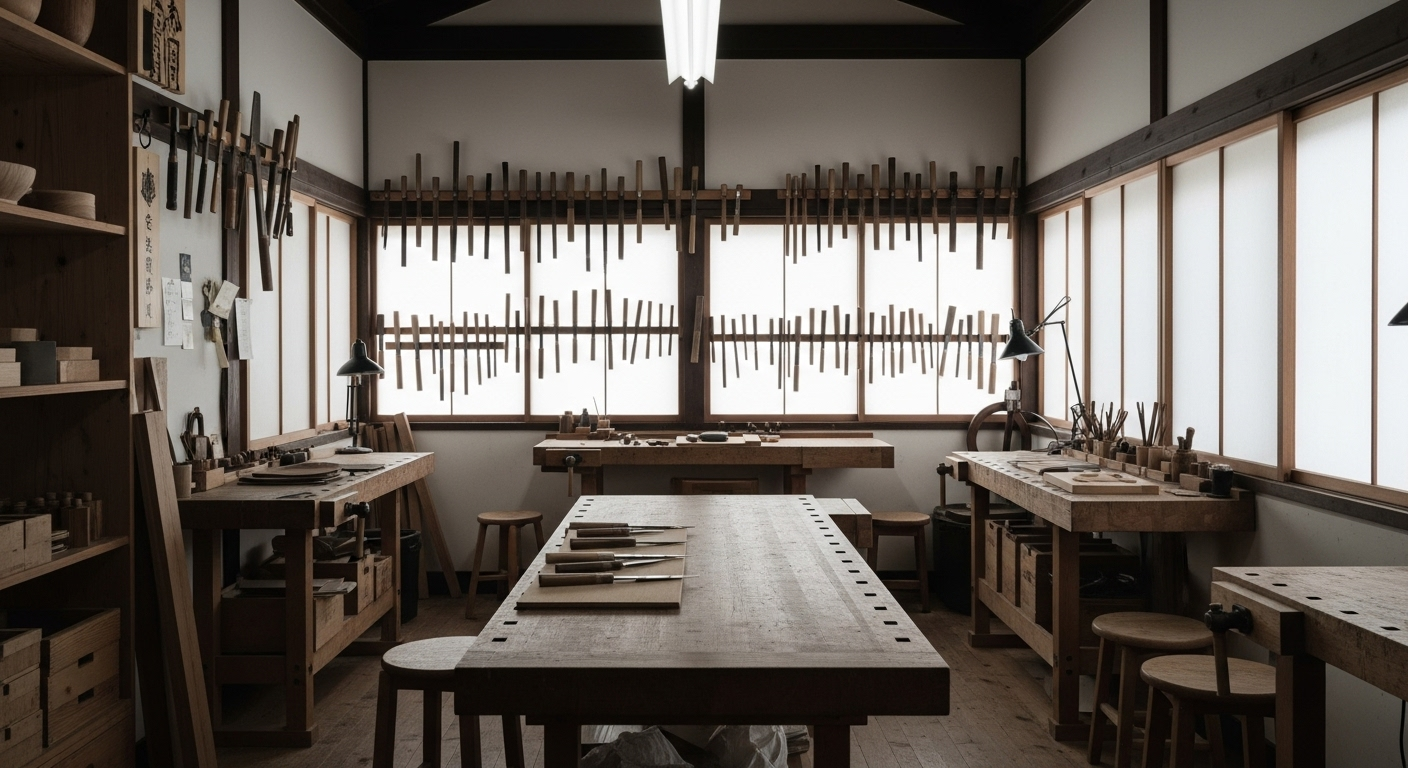

The Master Craftsmen of Sakai Uchihamono
In Sakai, centuries-old techniques are carried forward by government-certified Traditional Craftsmen. Each knife is not just a tool but a living symbol of tradition, precision, and spirit—kept alive through their hands.
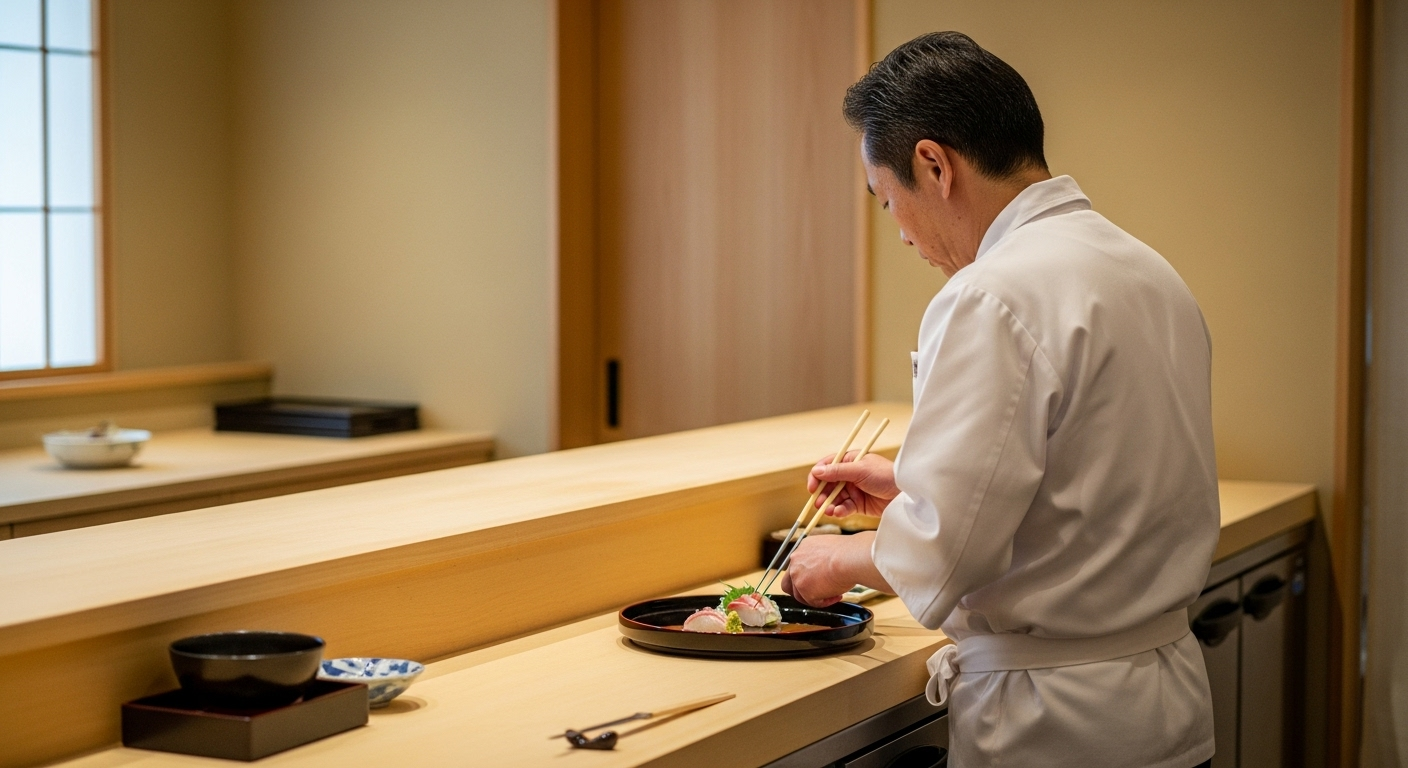
Why Do 98% of Japan’s Chefs Trust Sakai Knives?
For over 600 years, Sakai has perfected a unique craft where each stage—forge, sharpen, finish—is mastered by specialists. This tradition makes Sakai the birthplace of Japan’s most trusted knives.
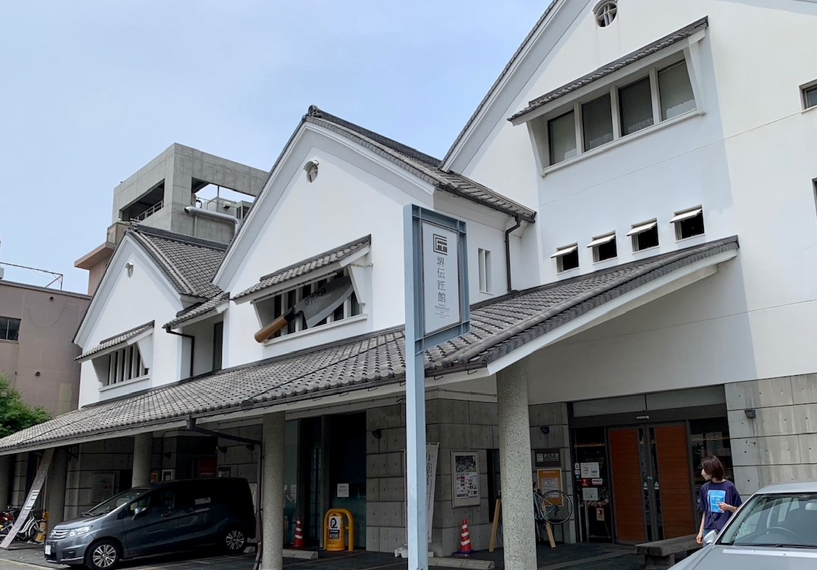
The 98% Statistic: More Than a Number
According to the Sakai Tourism Bureau, “98% of Japanese chefs use Sakai knives.” This figure isn’t just a claim—it reflects the deep trust chefs place in Sakai’s centuries-old craftsmanship.

Sakai’s Dwindling Masters: A Legacy at Risk
Once the heart of Japan’s finest cutlery, Sakai now has only a handful of blacksmiths left. With rising competition and fading interest among the young, new markets and fresh apprentices are vital to survival. Supporting these craftsmen means safeguarding a 600-year cultural legacy.
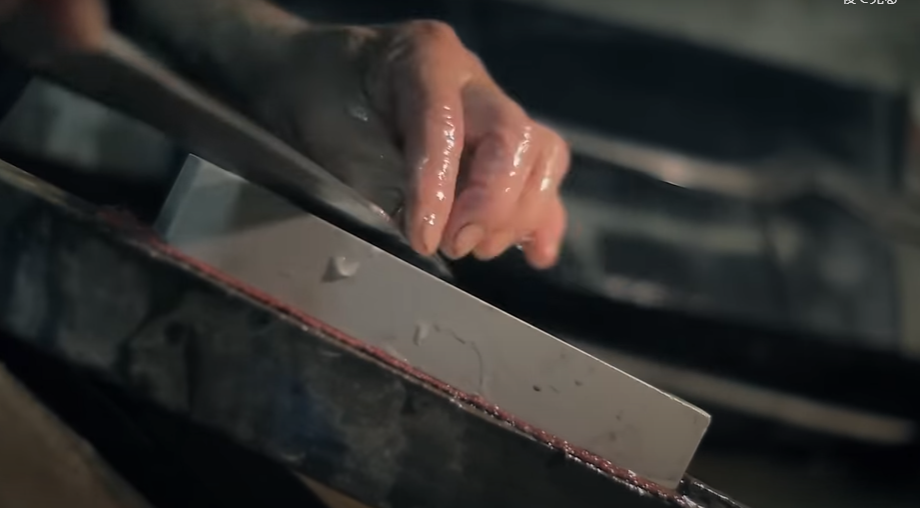
The Soul of Craftsmanship
-
Preserving Tradition, While Seeking New Traditions
“Tradition is not just about preserving the past; it is also the foundation for building the future.”
-
As a craftsman dedicated to the art of sharpening, I see my role not simply as inheriting techniques but as carrying forward a living tradition. Our predecessors refined their skills through endless trial and error, and in the same spirit, we too must continue to adapt—seeking new methods, new forms, and new expressions of beauty.
-
For instance, finding ways to harmonize sharpening with modern lifestyles, or elevating it beyond functionality to the level of artistry, is also a way of safeguarding tradition. To me, tradition is not something rigid or frozen in time—it is alive, and it evolves through our daily practice at the whetstone.
-
In today’s society, traditional crafts are sometimes dismissed as outdated. But in truth, they are filled with timeless wisdom and techniques that transcend generations. The challenge lies not only in preserving these methods but also in determining how to pass them on—refined, relevant, and ready for the future.
-
Whenever I sharpen a blade, I imagine the next generation of artisans who will inherit this work. Each stroke of the stone is my dedication to them, a silent wish that they will carry this craft forward with both pride and creativity.
-
To preserve what must be preserved, and to evolve what must evolve—that is our mission as craftsmen. It is both a responsibility and a profound source of pride.
How Japanese Knives Are Made: The Sakai Tradition
VIDEO PROVIDED: JAPAN TRADITIONAL CRAFTS AOYAMA SQUARE (YOUTUBE)
-
Sakai Forged Blades — Six Centuries of Unrivaled Craftsmanship
Loved by chefs around the world and trusted by 98% of Japan’s top culinary professionals, Sakai knives are more than tools—they are the living legacy of over 600 years of master craftsmanship.
-
At KIREAJI, we work directly with the Shiroyama Knife Workshop in Sakai, Japan, ensuring every blade is hand-forged, finished to perfection, and shipped straight from the workshop to kitchens across the globe. No middlemen. No mass production. Only authentic, artisan-made knives, crafted to elevate your cooking for a lifetime.


